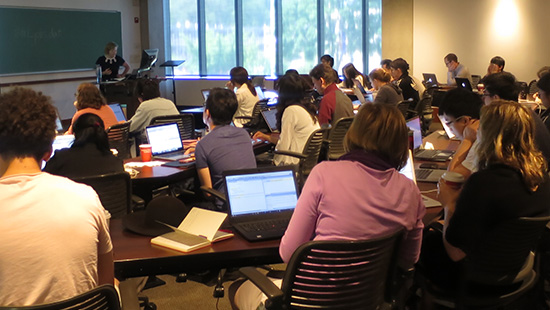Consultations
Get answers to your questions, help troubleshooting code, or advice on implementing data analysis methods from our consultants.
Data Science, Statistics, and Visualization
Research Computing and Data Services supports Northwestern researchers in learning and applying data science, statistics, and visualization skills, methods, and tools across all research domains. From text to images, from lab measurements to surveys, we assist researchers with collecting, analyzing, and visualizing all types of research data.
We help researchers apply methods from statistics, data science, computer science, and other fields to analyze and visualize data in their research domain. We combine expertise in technical skills with experience with the unique challenges of academic research to advance your work.
We support student, faculty, and staff researchers from all Northwestern schools. From faculty leading research teams to undergraduates working on research projects for the first time, all researchers are welcome.
Whether your research involves materials science or English, music or genomics, or any other field, we are here to support your work. For examples of past projects, please visit our project portfolio.
We support researchers with:
If you are facing a challenge working with research data or want to explore new methods or approaches, we’re here to help.
There is no cost for most services. For larger collaborative projects requiring significant staff time, we will work together to explore funding sources to support your project.
Funding from the Office of the Provost and Northwestern IT supports Data Science, Statistics, and Visualization services.
Help is available at multiple levels, from guidance on independent learning resources to direct support on collaborative projects. Request a consultation, register for a workshop, submit a project proposal request.
Get answers to your questions, help troubleshooting code, or advice on implementing data analysis methods from our consultants.
Make progress on your data projects with support from other researchers and staff data scientists.
Work with data scientists, statisticians, or visualization specialists to explore new approaches or create research products.
Sign-up for a workshop, find a tutorial, or access free online books, interactive courses, and videos.
We provide regular workshops, access to online training resources, and guides to help you use our services effectively.

Join us for an upcoming workshop to learn or improve your skills with R, Python, data visualization, and more. Find Workshops.
Student Data Science Consultants are a key part of our team. Learn more about the program.


Learn more about the impact of our data science, statistics, visualization services, and the team.